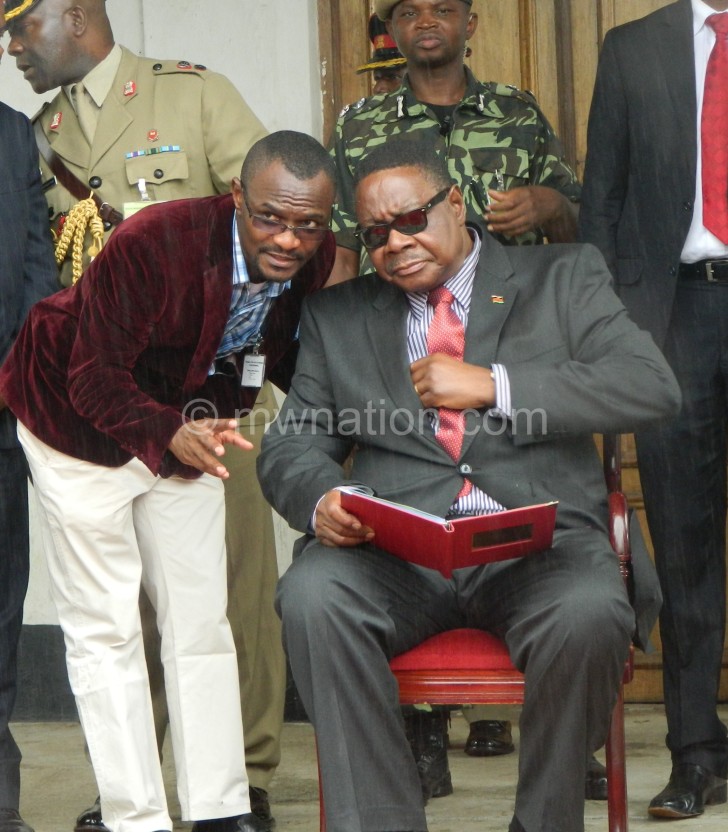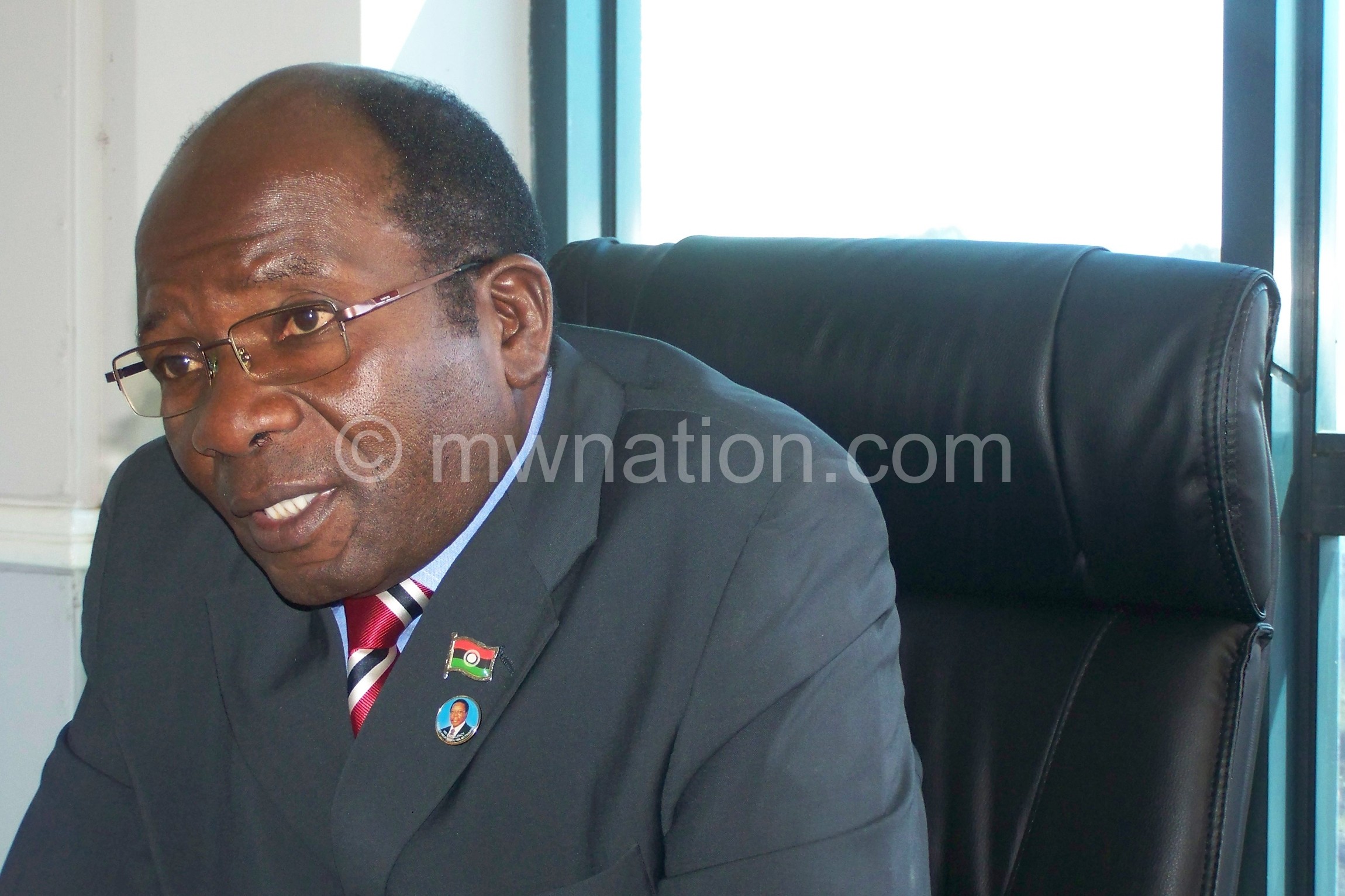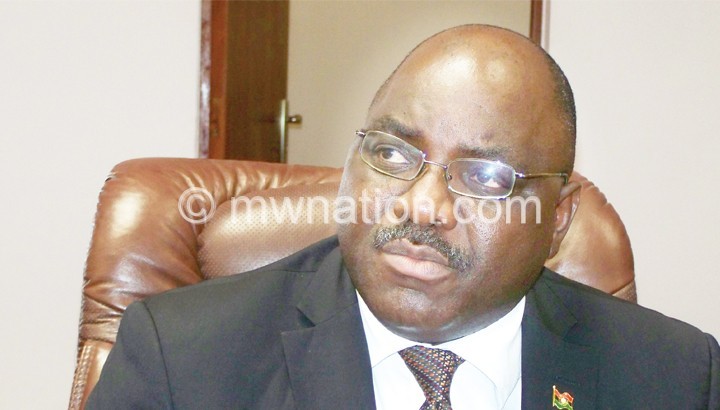APM’s aides in K307m package
While President Peter Mutharika has stuck to a 20-member Cabinet and more than halved the number of principal secretaries, the length of his advisers’ list is cancelling most of the envisaged savings.
A recent government special directory dated October 1 2015 records over 16 special assistants to President Mutharika.

Mutharika’s advisers’ line-up is more than double former president Joyce Banda’s eight and higher than the 10 for Zambian leader Edgar Lungu, who presides over an economy that is at least six times bigger than Malawi’s.
Analysts say whatever advice the President wants from his State House crowd can easily come from experts in relevant ministries, departments and agencies (MDAs) and save the taxpayer hundreds of millions of kwacha in avoidable perks.
Weekend Nation calculates that each advisor gets an average monthly package of roughly K1.6 million ($2 312), which translates to K25.6 million ($36, 994.21) a month for the 16, totalling K307 million ($443 641) annually.
The figure far outstrips the annual allocation to the Legal Aid Department, which in the 2015/2016 Financial Year got K384 million ($554 913) against the K1.6 billion that it had requested to hire more lawyers, acquire operational tools such as vehicles as well as stationery, among others, and help more poor Malawians to access justice.
Legal Aid has only eight lawyers when it was supposed to have 40 attorneys to handle 12 000 to 16 000 cases. It also has just two operational run-down vehicles when each of the presidential aides has an official vehicle and driver.

Weekend Nation has gathered that most of the presidential aides are put on P2 government grade where they go away with a salary of not less than K750 000 ($1 084) per month, fuel allocation of about K400 000 ($578), a minimum house allowance of K150 000 ($217), airtime, free water, free electricity, DStv subscription at a combined cost of almost K300 000 ($434), including a driver and guard who are also allocated about K100 000 ($145), among other benefits. This translates to the K1.6 million a month to an adviser.
Presidential aides also enjoy special privileges of accompanying the President to most local functions where they are booked into luxurious hotels and guest houses by State House, attracting more expenses for the taxpayer over and above the perks costs.
They are also provided with hefty allowances notwithstanding the free lodging-if working out of duty station apart from being given a guard and a cook if staying at a guest house at the State’s expense.
Within the legal framework, presidential advisers are tucked under Presidential Salaries and Benefits Act, which gives the Head of State a leeway to use the privileges attached to it as it pleases him or her.
An inside source said last week the President can put his or her assistants anywhere between P2 and P4 government grades where at the end of the contracts, they receive a gratuity calculated at 15 percent of their salary.
The list of presidential aides includes special adviser on maternal health and safe motherhood, chief political adviser, chief adviser on domestic policy, chief economic adviser, special assistant and advisor on national unity and parliamentary affairs, special assistant responsible for the civil society and NGOs, adviser on religious affairs, special assistant on youth affairs, special assistant on women affairs, personal assistant on special duties, personal assistant on international relations, deputy personal assistant on international relations, special assistant to the First Lady, executive and special assistant on capacity building.
Last week, President Mutharika made another round of appointments to his pool of special advisers when he engaged, Democratic Progressive Party (DPP) long-time spin-doctor Hetherwick Ntaba as domestic policy adviser.
Asked to justify the number of advisors given the existence of experts in MDAs, Information Minister Jappie Mhango did not mention the number of advisors for President Mutharika instead he commented on the recent changes that the President has made on his team of aides.
Said Mhango: ‘‘While Dr. Ntaba has come in as chief adviser on domestic policy, Bright Malopa ceased to be an adviser to the President on communication and strategy at the State House. He moved to Macra as adviser on broadcasting. Collins Magalasi has always been and will continue to be chief economic adviser to the President. He has just been given additional responsibilities of executive assistant to the President. You can see, therefore, that this does not add the number of advisers,’’ he said.

Mhango added that Ntaba’s terms of reference (ToRs) as chief adviser on domestic policy was to give advice to the President on a wide range of domestic issues as required by the Head of State, also saying the advisers are put on government grades D and E.
He further disputed the idea that there is duplication of roles between the advisers on one hand, ministers, principal secretaries and directors on the other.
“The notion that Cabinet ministers and presidential advisers are duplicating roles is flawed. A Cabinet minister indeed gives advice to the Head of State on certain issues, but he or she has so many other Cabinet responsibilities as well.
“On the other hand, the President’s advisors are a full-time employees to advise the President on certain issues,’’ said Mhango.
But according to a former presidential adviser in the previous regime who asked not be mentioned, there could be no limits to the number of advisers a president can choose.
“It is the President who decides whom he wants as an advisor and he recommends to the Chief Secretary who writes letters of appointment. As regards to the numbers, there is no limit because it is solely at the discretion of the Head of State. That is why you see differences in numbers and scope in various administrations,” said the source.
Comparatively, former president Joyce Banda had a team of eight presidential aides.
But the directory shows that President Mutharika has various special aides who are performing a similar job to that of other institutionalised personnel within the government set-up, among them those of economic affairs, international relations and safe motherhood.
OPC last week confirmed the engaging of former Cabinet minister Heatherwick Ntaba as chief adviser to Mutharika on domestic policy while Mutharika’s chief adviser on economic affairs Collins Magalasi is said to have been given the position of presidential executive assistant.
The development comes in the shadow of government’s effort to cut spending by streamlining some positions within the government set-up.
In September 2015, Vice-President Saulosi Chilima announced that government had trimmed the number of principal secretaries (PSs) who are usually either in P1 or P2 grades from 96 to 41, against 19 ministries as part of public service reforms that were put into motion last year.
Questions have been raised on the Chilima-led reforms drive with analysts describing the process as moving in circles in that while the Executive was seen as making progress on one end, it was also peddling in reverse by making unwarranted appointments.
University of Malawi’s Chancellor College-based political analyst Mustafa Hussein said the responsibilities accorded to the advisers would have been ably handled by Cabinet ministers and PSs in various MDAs.
“This kind of setup requires proper justification by the administration because obviously this is a case of duplication of roles. In the first place, there was no need to appoint people to do jobs for which there are already other qualified personnel who can do it, unless in very specialised cases such as religious affairs and civil society perhaps. But definitely not in areas where we already have ministries and departments with qualified and experienced technocrats doing the same job. This is merely political appeasement,” he said.
Hussein said among the consequences of the status quo include the drain of government resources and conflict in advice provided across the strata.
He added that: “Otherwise it is the quality of advice that counts at the end of the day. We have seen incidences whereby the counsel provided by some of the advisers has caused an embarrassment to government. This means most of these should not have even be there,” he said.
Mutharika’s maintenance of a bloated full-time advisory team is on the back of financial and economic challenges facing the country, with government failing to meet budget allocations to MDAs, including to public health facilities where drug stock-outs have worsened and patients rarely get the required three meals a day.
On the economic front, annual average inflation rate rose to 24.6 percent in 2015 despite the administration projecting that the general rise in prices would drop from 23.8 percent in 2014 to 16.4 percent in 2015.
Malawi’s currency, the kwacha has also depreciated sharply, making life expensive for the majority.
Regional trends show that it is common practice that presidents in the Southern African Development Community (Sadc) region enlist the services of special advisers, but the numbers and scope vary.
Zambian leader Lungu currently has 10 aides for an economy that in 2014 was estimated to be worth $27 billion while Malawi’s hovers around $4 billion.





